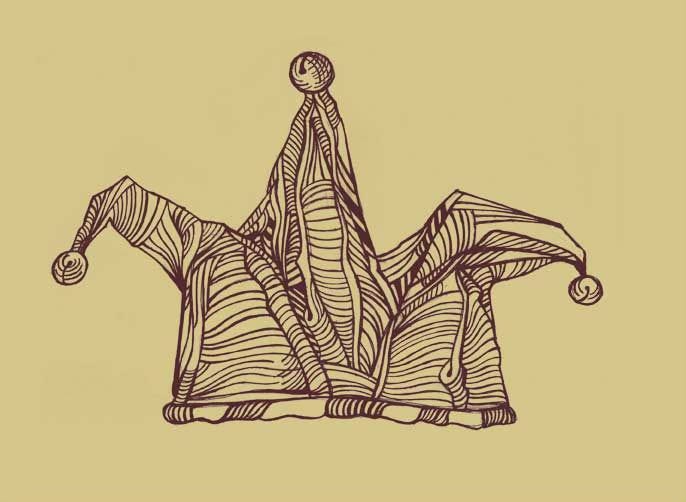Via negativa is a way to explore a subject by starting with what it is not. As I launch into this series on discernment (and what makes for a discerning person), it’s helpful to start by outlining the contours of what discernment is not. Thankfully the bible has a vivid category for what a discerning person is not — the fool.
According to ancient biblical wisdom, there are wise, foolish, and wicked people, with parts of each playing out in every one of us. Some of us, however, become specialists. As a connoisseur of folly, the fool is an instructive foil for discernment. This is also a timely direction to follow because our age seems to have an unending appetite for folly, conferring celebrated status on biblically defined fools.
The fool is not a flat, one-dimensional bonehead in the Bible’s wisdom literature but a well-developed and often dangerous dumb-ass with an arsenal of unsavoury qualities layered throughout. The fool comes capped with a witless combination of pride, willfulness, impatience, self-absorption, presumption, and dishonesty.
Contrary to common assumption, a fool is not unsophisticated or unlearned; higher education has its fair share of papers and people along the folly spectrum, like college presidents unable to condemn calls for genocide in campus demonstrations. The Hebrew words for “fool” do not refer to one short on grey matter but instead one lacking the appropriate heart matter. He is someone whose deficiency is in moral humility and refuses to yield to God or others. “The fool says in his heart, ‘There is no God.’” says Psalm 14:1, while the beginning of wisdom is the fear of the Lord. (Proverbs 9:10)
Another word for “fool” refers to someone who will not receive truth. “A fool takes no pleasure in understanding, but only in expressing his opinion.” (Prov. 18:2) A fool stumbles around continually banging one’s shins against the furniture of the universe. When confronted with reality, the fool is recalcitrant and unbending, meeting truth with inventive adjustments, tailoring the truth to fit himself. Biblical scholar Derek Kidner writes of the fool: “he has no reverence for truth, preferring comfortable illusions.”
Part of this folly is a blinding pride. Fools are unteachable know-it-alls, eminently wise and right in their own eyes (Prov. 12:15), dismissive of counsel. The maddening dynamic is that such a person is “often in error but rarely in doubt.” They provide virtuoso displays of the Dunning–Kruger effect (the cognitive bias in which people with limited competence overestimate their abilities). Neal Plantinga observes that the fool will “give you a piece of their mind they can hardly afford to lose.”
There is a willfulness to this all this folly - a fool is someone who shirks personal responsibility. A fool will not turn back from her course of action or admit she is wrong. It is a willful arrogance leading her to make excuses or externalize blame rather than receive correction or face herself.
There is more; Proverbs provides an extensive biography of the fool but here is a quick resume sketch of the one who lacks discernment:
“despises wisdom and discipline” (1:7)
“finds pleasure in wicked schemes” (10:23)
“the way of the fool seems right to him” (12:15)
“a fool shows his annoyance at once” (12:16)
“the heart of the fool blurts out folly” (12:23)
“the folly of fools is deception” (14:8)
“fools mock at making amends for sin” (14:9)
“a fool is hotheaded and reckless” (14:16)
“A fool finds no pleasure in understanding but delights in airing his own opinions” (18:2)
“every fool is quick to quarrel.” (20:3)
“He who trusts in himself is a fool.” (28:26)
“If a wise man goes to court with a fool, the fool rages and scoffs, and there is no peace.” (29:9)
“A fool gives full vent to his anger, but a wise man keeps himself under control.” (29:11)
While much of human folly is silly and sometimes amusing, most of it is not because it is consequential. Ignorance, poor judgment, deception, scoffing, and the like, coarsen, maim, and kill. The prophet Isaiah notes a certain through-line of corruption in folly and wickedness: “For fools speak folly, their hearts are bent on evil: They practice ungodliness and spread error concerning the Lord; the hungry they leave empty and from the thirsty they withhold water. Scoundrels use wicked methods, they make up evil schemes to destroy the poor with lies, even when the plea of the needy is just.” Foolishness has a momentum that leads to wickedness, granting permission to the worst inclinations in us and paving the way for a reign of error. The tragic trajectory of folly is seen in it’s wake of injustice. Making discernment a justice issue too.
In sum, a fool is out of touch with reality. Discernment, however, is reality based. A discerning person attends to and notices the way the world is, in both its beauty and brokenness. Neal Plantinga observes that “discernment, in other words, shows a kind of attentive respect for reality … The one who discerns also loves.”
I think this is, at base, the tell-tale failing of the fool — the failure to love and the avoidance of love’s obligations. The mark of discernment is love, which then opens a window into reality that remains closed to the unloving. Love of God is a light to our hearts and minds, enabling us to see and understand reality rightly.





Will you ever have your book Seeking God’s Face printed in a large print edition?
Love this Phil. I had a little laugh when I read this "Neal Plantinga observes that the fool will “give you a piece of their mind they can hardly afford to lose.” Oh God increase our love, and open the window and help us understand reality rightly! Thanks Phil